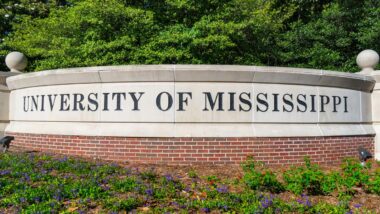Top Class Actions’s website and social media posts use affiliate links. If you make a purchase using such links, we may receive a commission, but it will not result in any additional charges to you. Please review our Affiliate Link Disclosure for more information.
UPDATE:
- A judge dismissed this case Dec. 19, 2019.
A Grand Canyon University student has filed a class action lawsuit alleging that the private, for-profit school deceptively markets the value and nature of its professional programs by misleading its students to think it has accreditation that it does not.
Additionally, the students argue that the university further misrepresents itself to students by taking out loans for students without their knowledge or consent.
The Grand Canyon University accreditation class action lawsuit was filed by Katie Ogdon who signed up for Grand Canyon University Master of Science in Psychology with an emphasis in Health Psychology program.
Ogdon says she did this because she was told that the program was a suitable way to reach her intended career.
However, she claims to have later discovered that the school did not have the appropriate accreditation to allow her to qualify for licensure as a mental health therapist in California, as she had intended.
Allegedly, the school uses “advisors” who market unaccredited professional programs to students. Ogdon states that these advisors recommend that students take classes that will not allow them to quality for licensure.
According to Ogdon, the school enrolls thousands of students per year in unaccredited programs. She notes that primarily, these students aim to pursue careers in the healthcare and educational fields.
The Grand Canyon University accreditation class action lawsuit states that Ogdon and many other students are financially injured by this practice, because they are effectively tricked into paying for education that is useless.
She states that no student would knowingly enroll in a professional degree program only to obtain a degree that is not accepted.
The plaintiff further stresses that this scheme prohibits students from transferring their coursework to an other institution — one with an accredited program — because an accredited program will not accept Grand Canyon University course credits.
The Grand Canyon University accreditation class action lawsuit states that GCU systematically puts profits ahead of its students best interest.
She notes that the school is a for-profit university, but argues that the school tricks students into thinking it is non-profit because of how GCE, Grand Canyon’s educational services business, was strategically distanced from the school.

Ogdon explains that the school hires low-quality professors and pays them a low wage, often on a part-time basis.
She asserts that the school spends only 15 percent of its revenue on faculty salaries, whereas most four-year accredited universities spend around 70 percent of revenue on faculty salaries.
The school is allegedly lacking in training and support for these underpaid professors and doles out substandard educational materials to students.
Allegedly, these elements make the program profitable for the school, but prevent it from meeting the standards necessary for accreditation.
The Grand Canyon University tuition class action lawsuit then goes on to say that the school intentionally keeps students in the dark about the nature of their education in other ways. The also school perpetuates this scheme through information misleadingly presented by the school “advisors.”
Additionally, Ogden says that the school is mostly funded by the tuition of students gained through student loan programs.
She argues that this means that the federal government is “wasting hundreds of millions of dollars each year of unaccredited degree programs which do not advance students or their professional careers.”
Ogdon notes that many students at Grand Canyon are online students, explaining that the school gains a significant portion of its revenue from these students.
School representatives are reportedly told to recruit students by glossing over the school’s method for procuring student loans to pay for a Grand Canyon University tuition. Specifically, Ogden says that the representatives do not explain that the school takes out loans on their behalf, nor do they tell them the amount of the loans.
Allegedly, the school relies on the fact that that most student loan payments are not due until after a student has graduated, so many students at Grand Canyon University complete their studies before they realize that they are in thousands of dollars in debt without their previous knowledge.
These allegations are not the first launched against Grand Canyon University over misleading marketing tactics.
If you pursued higher education, how did you choose your educational institution? Share your experiences in the comments below.
Ogdon is represented by Annick Persinger, Hassan A. Zavareei, and Kristen G. Simplicio of Tycko & Zavareei LLP.
The Grand Canyon University Accreditation Class Action Lawsuit is Katie Ogdon v. Grand Canyon University Inc., et al., Case No. 1:20-at-00363, in the U.S. District Court for the Eastern District of California.
ATTORNEY ADVERTISING
Top Class Actions is a Proud Member of the American Bar Association
LEGAL INFORMATION IS NOT LEGAL ADVICE
Top Class Actions Legal Statement
©2008 – 2024 Top Class Actions® LLC
Various Trademarks held by their respective owners
This website is not intended for viewing or usage by European Union citizens.
















61 thoughts onGrand Canyon University Class Action Alleges Accreditation Scam
I am absolutely disgusted with this school and while it may be an okay school to attend maybe in person but if you need CACREP acreditation for your state DO NOT GO HERE. I have emails from a SSC that is no longer there straight up lying stating I will be fine and that I will be able to become board certified in my state of MISSOURI (requires CACREP). Yes I should have done harder research myself, 100% BUT how can they be so okay with scamming people and lying right to their faces. Knowing that it will take a million extra steps and hoops to become licensed in my state from this worthless to me degree. so upsetting I now have to change schools and add an additional year and 9 months of debt and time to my plate. GCU SHOULD BE HELD ACCOUNTABLE FOR THEIR LIES AND SCAM AND REPAY THE THOUSANDS OF DOLLARS THEY SCAMMED!! Those of us trying to better ourselves only get buried with more debt from their blatant disrespect for their students and the inability to do anything with our degrees. They should have to openly let students know that the state they are in will not allow them to become board-certified.
I have been trying to get a job in Emergency Management since I graduated with a Master’s of Leadership with an Emphasis in Disaster Preparedness and Executive Fire Leadership in February 2019. I was told that this would easily get me hired in the career field, especially since there are so many disasters going on around the world. I asked if I should look into another degree program since I had no firefighting experience/background but wanted to get into the emergency management field if possible, and this was the closest thing they could offer to that. I was told that it didn’t have any effect on me getting into that field because of the coursework involved qualifying me. I do not have email access to many email exchanges between myself and the 3 advisors I had over that time, so I figured I have no concrete proof to have anything done about it. Also, many of these conversations were over the phone, so how could I prove they lied about my career opportunity chances. I am now drowning in school loan debt and have never been able to get into the emergency management field at any level. I have been accepting whatever roles I can over the years since but have yet to have a solid opportunity/career that meets my financial goals or is even in line with my Master’s Degree. If I had known that it would be near impossible for me to get into the career field with this degree, I would have never chosen this program and wasted my time and money. I would have stayed in the ministry field that was more in line with my completed undergrad and associate degrees.
I was a student at Grand Canyon University bavk in 2013. I had to drop out of classes due to breast cancer. They received my loan money and when I dropped my classes they never returned any of the Pell grant money or loan money.
I also was tricked into believing I could practice in my state of Michigan as a Professional Counselor, when in fact we are not CACREP, I enrolled at GCU under the assumption, they are a Christian organization? I am confused on that? Also non-profit, when they are on the stock market and have earned billions. They over charge credits, triple the cost. I am now have an enormous debt, with student loans and have degrees, I can’t even use. I have become nothing but a “cash Cow” to GCU now am in debited to Mohela. I am willing to sign any class act suit, that is available. Not sure what to do?
I am currently enrolledat GCU with graduation expected in November of this year. I was never told that I couldn’t be licensed in Oklahoma… was told that this BS WOULD lead to licensure. According to the Pell grants I have been receiving, I should not have any debt upon completion. All additional funds get returned to the financial aid department at GCU. I am not getting loans and should not at the end. Help? I am confused and unsure of what to do!
Has anyone had trouble with GCU giving their refund?
I totally agree with this lawsuit! I was never told about accreditation or educated on the loans. When I had to do a military move from az to ks I was lied to and told the program was recognized by the Kansas board. That was a lie and I later found out that because this degree has no CACREP accreditation I am super limited in what I can do with it. It was so deceitful the way they did things and kept us in the dark. I failed the national counselor exam 4 different times and nothing was taught about how to actually apply for and get licensed in your state. I asked for a list of states that were recognized because at the time I was a military spouse and I needed to know this. They wouldn’t tell me anything but after 2 days I got an email that said the program was recognized in Kansas. It was not so I filed for borrower defense due to this my income has suffered and I am extremely limited with an Arizona counseling license living in Kansas. Arizona is the only state that would honor this program. Its sad that they can continue to deceive people like this and I’m glad students are finally speaking out against schools who deceive students. Especially when all the requirements to be a therapist are already difficult and then you graduate to find no one recognizes this program but you are still responsible for all this debt. I am willing to fight that!!
Hello I have failed twice I have to retake this one my third time I am so upset with this. I’m disappointed with what I’m learning and reading from everyone. Did you pass your exam after all?
Just happened to me. Already playing the switched degree trick and I hadn’t even began my classes. How do you go from a Bachelor of Arts in Government with an emphasis on Legal Studies to a Bachelor of Science in Psychology?? Well the answer to the question is that they make knowingly false assertions to educational grant providers in order to scam money from them, in my case this “counselor” picked the wrong student to say that to. Unfortunately for him, I happen to be the CEO of a company formed to, inter alia, conduct legal investigations into matters involving potential rights violations, scams and malpractice. Having said that here, I’m going to call the “counselor” in a few hours and see what all, if anything, I can get him to confess, but this time he will be recorded. My state of residence happens to maintain a one-party consent requirement as it pertains to the admissibility of unknowingly recorded communications. We’ll see what happens. In any event, I would love to discuss my GCU experience with a licensed attorney if any are interested. I experienced the same misleading and false recruitment tactics as many other students that commented before me.
Looks like I’m apart of this train wreck as well. I graduated in 2014 with a BS in Healthcare Administration and thought I was going to be able to go right into my field of study. Nope!! They didn’t teach me a damn thing applicable to the health care field. This place is a joke. I’m in debt and have lost too much money to that place.
I was told by a department chair that my Mental Health and Wellness degree is not part of counseling or psychology but is marketed as such to obtain more hits. If that’s not deliberate false advertising, I don’t know what is.